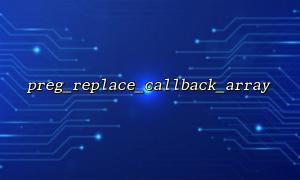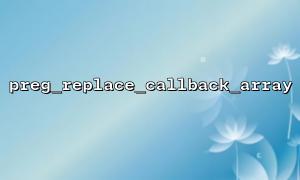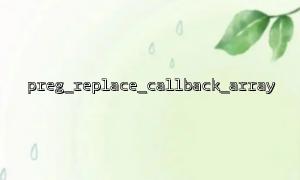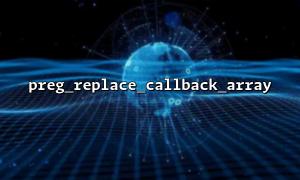In PHP, regular expressions provide strong text processing capabilities, especially when text replacement and pattern matching is required. preg_replace_callback_array is a very useful function that can be used to handle complex replacement operations, especially when fine-grained operations are required for different types of markup languages (such as HTML, Markdown, etc.). This article will explain how to use the preg_replace_callback_array function to distinguish and process these markup languages.
preg_replace_callback_array is a function in PHP that allows you to perform a series of regular replacement operations by providing an array of callback functions. Unlike ordinary preg_replace , it can call different callback functions for each matching pattern, making the processing logic more flexible. The basic syntax is as follows:
preg_replace_callback_array(array $patterns_and_callbacks, string $subject);
$patterns_and_callbacks : an associative array, the keys of the array are regular expression patterns, and the values are the corresponding callback functions.
$subject : The text to be processed.
This approach is particularly suitable for complex replacement requirements, such as handling different types of markup languages in the same text.
In many web applications, it is often necessary to parse and process markup languages in many different formats. For example, HTML and Markdown coexist on the same page, or different markup languages need to be converted into a unified format. Using preg_replace_callback_array allows us to easily define a separate approach for each markup language.
Suppose we have a text that contains links in HTML and Markdown formats, which we want to replace in a unified format. In this case, we can use preg_replace_callback_array to handle links in these two different formats.
Defining regular expressions : We need to define regular expressions for HTML links and Markdown links, respectively.
Definition callback function : Define a callback function for each link format matched by the regular expression to implement replacement.
Call preg_replace_callback_array : pass the regular expression and callback function to preg_replace_callback_array for processing.
<?php
// Enter text,IncludeHTMLandMarkdownFormat link
$text = "This is aHTMLLink:<a href='http://m66.net/example'>Click here</a>\nThis is aMarkdownLink:[Click here](http://m66.net/example)";
// 定义正则表达式and回调函数
$patterns_and_callbacks = [
// matchHTMLLink
'/<a\s+href=["\'](http[s]?:\/\/m66\.net\/[^\s"\']+)["\'][^>]*>(.*?)<\/a>/' => function ($matches) {
return "HTMLLink:{$matches[2]},URL:{$matches[1]}";
},
// matchMarkdownLink
'/\[(.*?)\]\(http[s]?:\/\/m66\.net\/([^\)]+)\)/' => function ($matches) {
return "MarkdownLink:{$matches[1]},URL:http://m66.net/{$matches[2]}";
}
];
// usepreg_replace_callback_arrayMake a replacement
$result = preg_replace_callback_array($patterns_and_callbacks, $text);
// Output the result after processing
echo $result;
The first regular expression is used to match the <a> tag in HTML, capturing the URL and link text.
The second regular expression is used to match links in Markdown format, capturing link text and URLs.
For each match, the callback function returns a custom format, outputting the link's text and URL.
This is aHTMLLink:HTMLLink:Click here,URL:http://m66.net/example
This is aMarkdownLink:MarkdownLink:Click here,URL:http://m66.net/example
preg_replace_callback_array provides several important advantages:
Flexibility : You can define different callback functions for each regular expression pattern, and the processing logic can be very complex.
Maintainability : When you need to apply different processing rules to different markup languages, the code is organized more clearly and easy to maintain.
Efficiency : By combining multiple replacement operations together, you can complete all replacements in one text processing, thereby increasing efficiency.
There may be some more complex situations when dealing with multiple markup languages. For example, HTML and Markdown may be used in nested, or the same text contains tags of multiple formats. Preg_replace_callback_array , you can flexibly apply different replacement strategies based on the specific content of the match.
<?php
$text = "This is aHTMLLink:<a href='http://m66.net/example'>Click here</a>\nThis is aMarkdownLink:[Click here](http://m66.net/example)";
// 定义正则表达式and回调函数
$patterns_and_callbacks = [
'/<a\s+href=["\'](http[s]?:\/\/m66\.net\/[^\s"\']+)["\'][^>]*>(.*?)<\/a>/' => function ($matches) {
return "HTMLLink:{$matches[2]},URL:{$matches[1]}";
},
'/\[(.*?)\]\(http[s]?:\/\/m66\.net\/([^\)]+)\)/' => function ($matches) {
return "MarkdownLink:{$matches[1]},URL:http://m66.net/{$matches[2]}";
}
];
// usepreg_replace_callback_arrayMake a replacement
$result = preg_replace_callback_array($patterns_and_callbacks, $text);
// Output the result after processing
echo $result;
This code implements links to HTML and Markdown formats and unifies them into one format for easy subsequent processing.
preg_replace_callback_array is a powerful tool that is especially suitable for handling complex regular replacement tasks. It provides flexible and efficient solutions when it is necessary to process multiple markup languages in one text. By rationally designing regular expressions and callback functions, we can easily distinguish and handle different types of markup languages.












